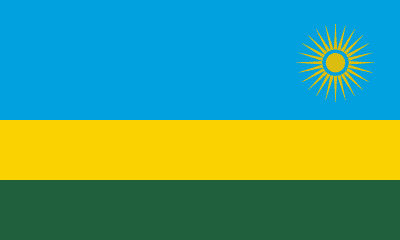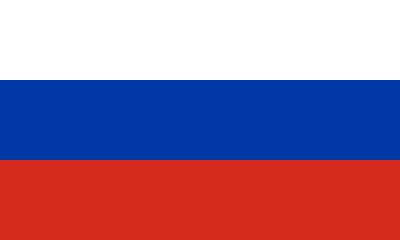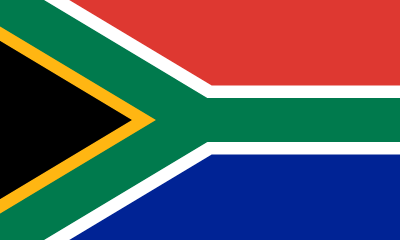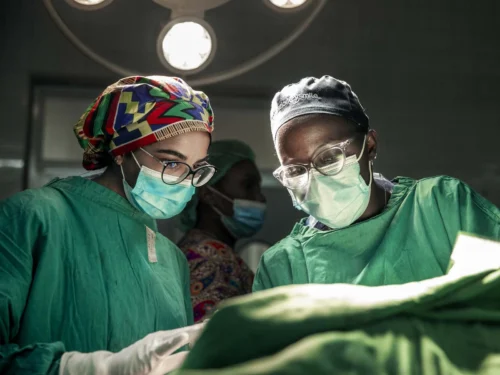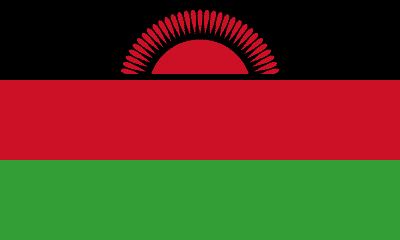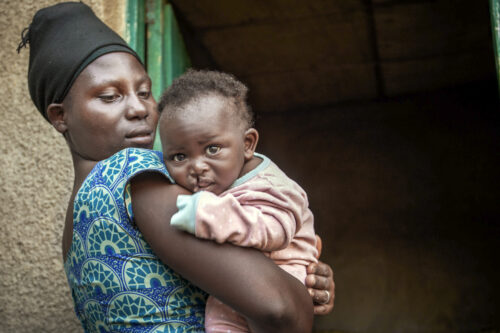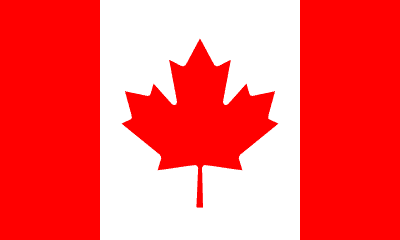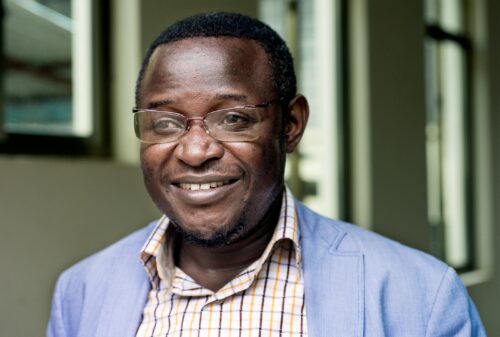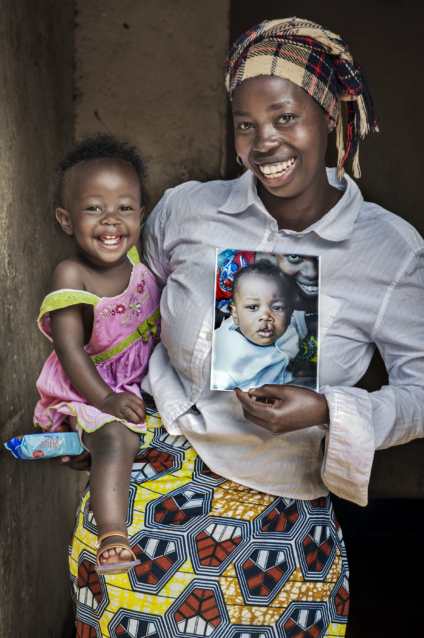
Operation Smile in Rwanda has delivered life-changing surgeries to more than 2,000 patients.
In 2013, Rwanda had only two plastic surgeons. Operation Smile has since helped to train 22 general surgeons in cleft and plastic surgery.
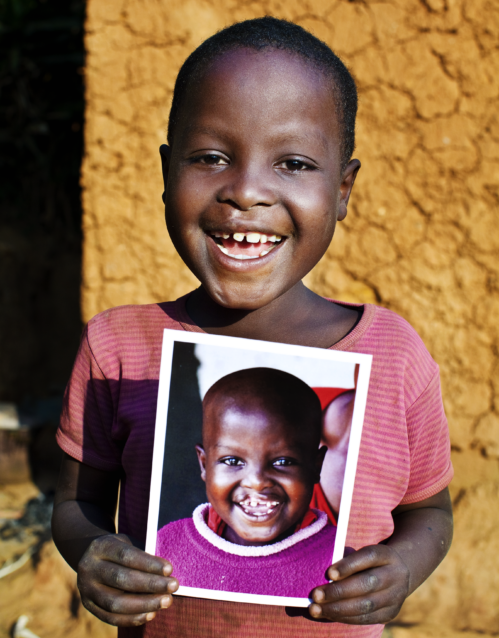
THE NEED
Recovering health system. The Rwandan genocide against Tutsi committed in 1994, a campaign of mass murder over the course of 100 days, led to a severe public health crisis. The healthcare system was overwhelmed by the impact of hundreds of thousands of deaths and injuries and many doctors fleeing the country. Since then, the government has made enormous strides in training new health providers and achieving the goal of universal health care.
Financial burden. Despite significant progress in increasing access to healthcare, a large portion of the population remains medically vulnerable. 55% of the population is at risk of impoverishing expenditure for surgical care, while eight percent is at risk of catastrophic expenditure for surgery. With 49% of the 14.4 million people living in Rwanda falling below the poverty line, patients face financial barriers to receiving the care they need.
Lack of access to surgery. The Lancet Commission on Global Surgery proposed that, to meet populations’ needs, countries should achieve 5,000 surgical procedures per 100,000 people. In Rwanda, surgeons deliver just 512 surgical procedures per 100,000 population.
Deficit of medical providers. The health workforce shortfall contributes to the lack of access to care. Compared to high-income countries, which have an average of 10 nurses and midwives per 1,000 people, Rwanda faces a shortage, with just 0.9 nurses and midwives per 1,000 individuals. Rwanda has one specialized surgical worker per 100,000 population, which falls short of the Lancet Commission’s minimum target of 20 providers per 100,000 population.
Barriers to education and employment. Operation Smile’s survey revealed that people living with cleft conditions in Rwanda experience difficulties with obtaining education and employment. 41% of patients arriving at Operation Smile programs who have a cleft condition or burn said that they do not go to school due to their appearance. 70% living with a cleft condition or burn reported having a hard time finding work.
OUR FORMULA FOR TRANSFORMATION
Operation Smile’s formula for transformational impact combines care delivery & capacity-building.
Education programs are at the center of Operation Smile’s strategy to increase access to surgery closer to the patient’s home.
Each surgical program brings together providers from all over the world for a unique opportunity to share knowledge and innovate. This type of bi-directional learning is essential to redistributing knowledge between providers and building capacity in the areas of greatest need.
Our work in health infrastructure & equipment addresses structural barriers to care and helps build robust health systems. Operation Smile’s research & innovation efforts inform all aspects of our decision-making and allow us to have a comprehensive understanding of the impact our programs have on patients.
HUB & SPOKES
To ensure that every child has access to care close to home, we equip the providers within our patients’ communities with skills and resources to deliver high quality care. We build the needed capacity by harnessing the talent and resources that exist within the country, usually in the bigger cities, the hubs, to train providers in under-resourced areas, the spokes, where most patients lack access to care.
In Rwanda, Operation Smile’s hub is based in Kigali at CHUK and the Rwanda Military Hospital.
Six district hospitals act as spokes in Ruhengeri, Gisenyi, Kibuye, Bushenge, Kibungo and Rwinkwavu.
We have gained the trust of the top two plastic surgeons in Rwanda, Prof. Faustin Ntirenganya and Dr. Charles Furaha, who have been instrumental in developing our five-year plan and are involved at the heart of our educational programs.
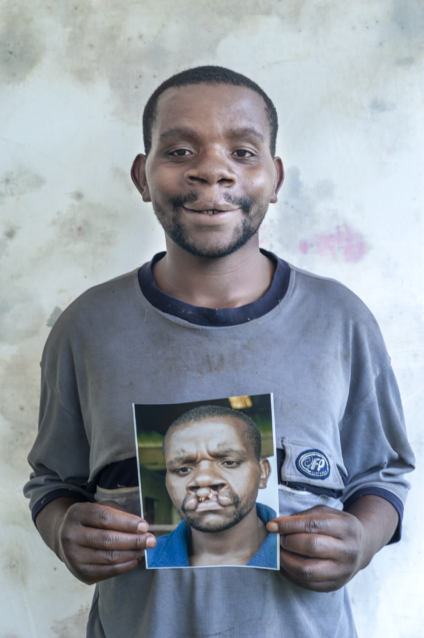
During Fiscal Year July 2024-June 2025, Operation Smile Canada will invest $198,169 CAD, accounting for 5% of South Africa’s total projected budget for the fiscal year, which will directly contribute to delivering life-changing surgical care for over 540 patients and provide training for around 1,100 medical providers.
Cleft Care Programs
Operation Smile plans to provide safe and high-quality surgery for over 540 patients. Operation Smile recognizes that a comprehensive care model should extend beyond surgery to support the complete rehabilitation and social inclusion of our patients. We plan to provide consultations in oral health (320 patients), nutrition (70 patients), psychosocial care (70 patients), ENT (10 patients) and speech therapy (10 patients). Operation Smile will train former patients as ‘Smile Ambassadors’ to support those seeking care, with a goal of engaging 42 Smile Ambassadors – one per district.
Education Programs and Infrastructure & Equipment
Partnering with Rwandan medical leaders and enabling access to education opportunities will allow local health systems to provide care to a greater number of patients in need of cleft and plastic surgery. Over the course of the year, we aim to deliver educational opportunities for around 1,100 medical providers. We will offer American Heart Association courses and provide training in the fields of surgery, speech therapy, psychology, nutrition, ENT, oral health, biomedical engineering, pediatrics, nursing and anesthesia.
Operation Smile will host a two-week educational program in Rwinkwavu to provide training to medical professionals. In addition, we will host six locally-led weeklong surgical programs that will have a focus on hands-on training and mentorship in the areas of surgery, nursing, anesthesia and pediatrics.
Operation Smile will continue to host 12 visiting professorships per year. The Ministry of Health will provide a biomedical technician at each District Hospital to support ongoing inventory checks and maintenance.
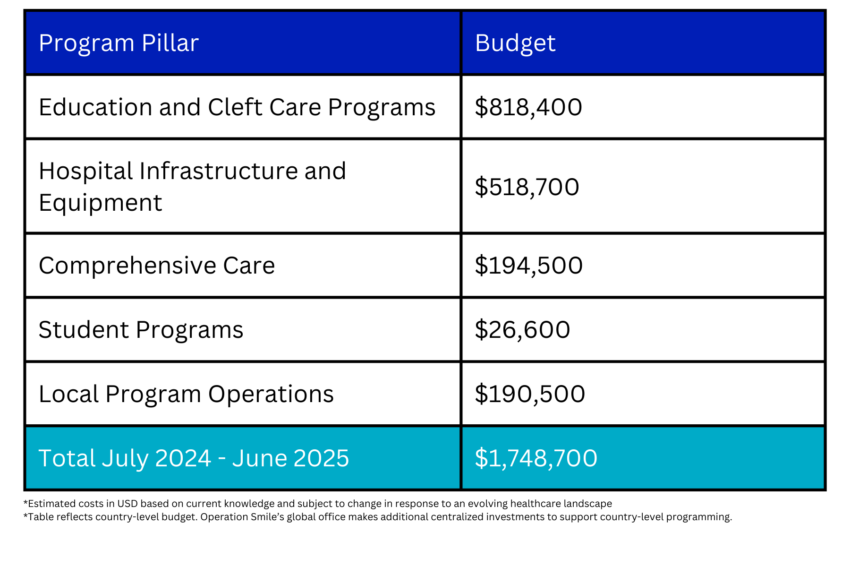
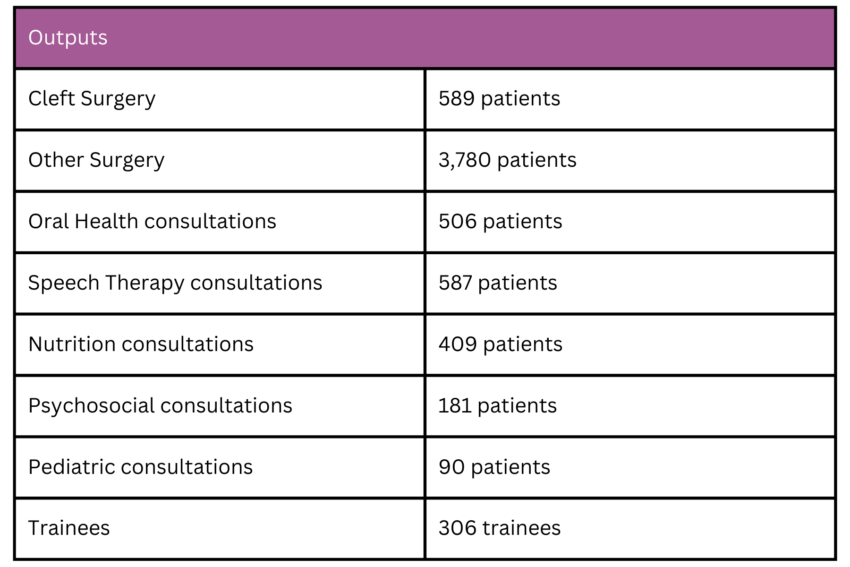
FIVE-YEAR VISION
Operation Smile will address barriers to cleft care in Rwanda by strengthening the health system and reaching a higher volume of patients across the country.
By utilizing the hub-and-spoke model, we will ensure that 100% of Rwandans live within 75 km of a facility providing plastic surgery.
Operation Smile believes that health workforce education and training will help us achieve sustainable and long-lasting impact.
Every surgical program has an educational focus; every table is an educational table, training both Kigali-based residents and host hospital staff.
The training of surgical teams will enable surgical care for over 51,500 patients over the next five years.
Each year we will conduct:
- Six locally-led weeklong surgical programs, led by Prof. Faustin and Dr. Furaha and additional core international instructors to provide training and mentorship.
- Three-week-long international surgical training rotations in Rwinkwavu, which will be phased out as local teaching capacity develops.
- Twelve visiting professorships.
Over the next five years, Operation Smile will provide 1,200 surgeries.
We will renovate surgical units and learning spaces at six district hospitals and enhance plastic surgery operating rooms and educational spaces in two regional hospitals.

